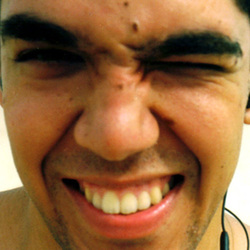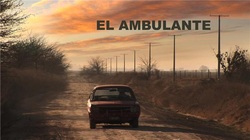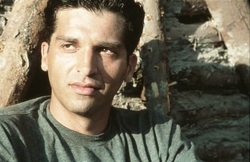Rumores Cultura
Entrevista/Interview

Pedro Lino é um dos mais bem sucedidos jovens animadores do país. Ainda a digerir o sucesso internacional da curta “O Homem da Cabeça de Papelão”, lança agora mais uma película sobre a vida do primeiro rei de Portugal.
Em que contexto surgiu o filme "Afonso Henriques"?
O filme foi uma encomenda do Museu Alberto Sampaio, Guimarães para
comemorar os 900 anos do nascimento de D. Afonso Henriques.
Pediram-me para fazer um pequeno filme a descrever aos mais novos
quem foi o primeiro rei português.
Como tem sido a reacção do público?
A reacção tem sido excelente, de facto tem sido uma surpresa, já que,
não tirando mérito ao filme, este foi feito em 3semanas, mas talvez
por causa dessa espontaneidade e que tem tido uma recepção tão boa.
E em relação ao novo filme, "Homem da cabeça de papelão", depois do sucesso da estreia nacional como tem sido a reacção no estrangeiro?
O filme vai estrear oficialmente nos Encounters de Bristol, no Reino
Unido, por isso ainda esta no inicio da sua carreira internacional. No
entanto fizemos uma ante estreia em Londres q correu muitíssimo bem.
A curta não tem uma temática fácil, nem se enquadra completamente nos
dogmas da animação, por isso não e um objecto tão fácil como o filme do D.
Afonso Henriques. Acho que este filme tem uma lógica muito "latina" e
muitos diálogos em português, mas pelas reacções gerais as pessoas
percebem a história e gostam do filme.
Quais são os projectos para o futuro?
Consegui recentemente um novo apoio para uma nova curta, " O Cagado",
baseado num conto de Almada Negreiros e estou a tratar da
pré-produção de uma serie infantil para televisão, que devera estar
pronta para o ano.
Sentes que tiveste que mudar para o estrangeiro para avançares ou poderias atingir os mesmos objectivos em Portugal?
No meu caso particular e visto que a animação tem uma componente
técnica muito forte, sentia-me de certa forma estagnado em Portugal. A mudança para Londres foi muito positiva pois num ano de trabalho
aprendi mais que em cinco em Portugal. Também o facto de haver uma
industria muito maior, mesmo que muito mais competitiva, também é uma
razão importante para eu notar uma grande diferença em relação a
Portugal.
Interview with the directors of El Ambulante

Eduardo de la Serna, Lucas Marcheggiano and Adriana Yurcovich`s El Ambulante tells the story of Daniel Burmeister, an Argentinean filmmaker that is redefining the concept of Low-budget filmmaking. I spoke to the directors to understand how three people can direct one film and much more.
This is not the first time you`ve worked together. How did you begin to collaborate?
Adriana: We met at an actor’s direction class and from then on we started writing and developing self managed projects and discuss fiction scripts. We did a short film and now this documentary. This is an informal collective, it`s not an enterprise. We just met at each other`s houses.
Eduardo: It’s a collective the only lasts for each film, it`s not an organization that will necessarily continue on making films, there is no plan that forces us to keep on working together.
How can three directors work at the same time?
Lucas: It was accidental. Eduardo found out about Burmeister and he told us his story. We talked about directing it the three of us but we didn’t think much about it. The three of us are very different. In a way we complement each other. Adriana pays more attention to production issues, Lucas is more worried about image and I am more concentrated on the narrative. So we trust each other and let everyone have the final word on each specialty.
A: we try to reach a consensus. The most difficult moments were in the post-production phase. Shooting was too fast to allow any discussion. During the editing we discussed pretty much every single shot. On extreme cases, when there was no consensus possible, it went to a vote. It turned out to be a much better picture than if only one of us had directed it because the different perspectives were all included in the film. When one of us wanted to include a shot he or she had to convince the other two.
E: It is a good thing we are three, it avoided a lot of problems.
How did you come up with the idea to make this film?
E: I did a small short film with my children called El Refugio de los Caracoles which was selected for a small festival in Argentina. There I was talking to the organizers that told me about this man that travels from town to town making movies with the locals. A few years later the Argentine Film Institute created some subsidies for low budget documentaries. It was then that we got together to work on the script.
How was working with Daniel Burmeister?
L: It was easy because we were working in a very small town. We respected his time and method of working and we only asked him to re-enact a few moments very occasionally.
A: When we were developing the project we realized that we should concentrate all the shooting in one place and record the process from the beginning to the end.
E: Anyway, if we had to travel from town to town it would have been an odyssey because he works very fast. He once told us that the time that took him to shoot a scene was the same we took to set the tripod (laughs). He was very charismatic, very funny man. At one point he got tired of being followed around everywhere but that`s normal.
Would you like to one day produce the same kind of films as Burmeister?
L: Not really. What interested us was to see how he worked, his process and method.
E: Yes, what interested us was that anti-industrial and almost revolutionary approach to filmmaking. We wanted to see how has this man managed to make a living of this. In a way we reclaim that anti-industrial approach. We prefer that form then the Hollywood way.
Do you plan to continue to work together?
A: We plan to help each other in future projects, yes. The idea is to keep on collaborating with each other but not necessarily direct together.
Do you feel the Oscar for The Secret in their Eyes T has helped change Argentinean cinema?
L: If there is change I haven’t seen it. At least in practical terms.
E: Yes, I don’t think Argentinean cinema is stronger because of the Oscar. It is definitely gaining more respect.
A: To be fair The secret in their Eyes is very different from most of Argentinean productions because it was huge. There are only 2 or 3 of this size per year. But on the other hand we produce something like 60 low budget films a year.
edited by Jude Lister
Previously publish in Nisimazine

Danis Tanovic is one of Eastern Europe’s most successful filmmakers. Since the release, in 2001, of the influential black comedy No Man´s Land, he has become a reference in the war genre, offering a fresh vision on the subject. His new movie, Cirkus Colombia, is the latest excursion on the impact of war in everyday life, always with an unmistakable touch of irony.
Was it a painful experience to revisit the period just before the war? Was this some kind of personal therapy?
My whole life is a personal therapy. It wasn’t painful; actually it was great to go back to that belle époque. It was a pleasure; I had been wanting to do it for a long time. It goes back to a flashback I had a few years ago. I remembered something just before war and I thought how weird it was that so much time had passed since I thought about that period. All I remembered was either my young childhood or war time. This period just before the war was like it had disappeared. War is like a big cloud, it covers everything.
So I had that episode and then I read this book, Circus Colombia, written by Ivica Đikić. I took bits and pieces from it and use it has a point of departure to write the screenplay. It wasn’t painful because I love to make movies, it is never painful. It is what I love to do. Even if some memories are painful.
Do you think Cirkus Colombia could help War Children and older generations remember how life was before the war?
We showed it at Sarajevo film festival and the film won the audience award. The audience was full of old and young people. I think they all understood it and got the message. Actually it is not a real message, at least not intellectually. It is more an emotional message, more than anything. The emotion always comes first. If there is something interesting about making movies is that they can stir up something powerful that gets a personal emotional response out of everyone.
What would you like to see being discussed from Cirkus Colombia?
I don’t know whatever they feel like. It´s funny because the same film can produce different reactions in different people, especially in different parts of the world. I just came back from Lebanon and I was delighted to see that they understood the film and what I was trying to say. I was pleased because then they started talking about their own problems, their own wars and how their lives used to be. It can start any kind of dialogue. The important is to create discussion.
You called a “personal trilogy”. What did you mean by that?
You know, I was kidding and someone made a real statement of it. I remember saying it was funny that I had made three films before, during and after a war. I joked that this could almost be a trilogy but there was never any intention or idea to make it a so.
So this doesn’t mean this will be your last war film?
I hope not (laughs).
You claimed your part of the world, Bosnia and Herzegovina, had a very out-of-time feeling about it. What did you mean by that?
I say nonsense all the time. Well, I spent 15 years in Paris and working in many different places in Europe and I realized time is very specific. In different parts of the world clocks tic differently. Here the clocks tics like in Europe but naturally we are in between east and west. It is hard to pin point what it is about it.
Miki Manojlovic is one of the biggest actors in Eastern European Cinema. He has become a somewhat iconic figure in European cinema in general. How was working with him and what do you think he brought to the part?
Himself. (laughs) I don’t know. He is a great actor and what do you get from great actor? Above all he brought great acting and a lot of fun. I love being with him. I love working with him, I would always be ready to work with him.
Edited by Jude Lister
Previously published in Nizimazine
